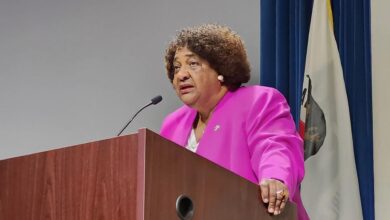
Bo Tefu | California Black Media
California Backs South LA Black Cultural District With $3 Million in State Funding
California is moving forward with a plan to create a Black Cultural District in South Los Angeles, backed by $3 million in state funding secured by State Sen. Lola Smallwood-Cuevas (D-Los Angeles).
The effort aims to formally recognize the historic and cultural contributions of one of the state’s largest Black communities.
The proposed district will honor neighborhoods like the Crenshaw Corridor, Leimert Park, and Historic Central Avenue. The funding will go toward public art, cultural markers, and monuments celebrating Black life, history, and creativity in South LA.
“This is about uplifting the powerful narrative of Black people in California’s history,” said Karen Mack, executive director of LA Commons, a nonprofit leading the community effort. “Everyone has a story to tell, and these stories help build belonging and connection.”
The district will be formally proposed to the California Arts Council, which oversees official state cultural district designations. Supporters say it will help protect Black heritage in the face of growing threats, including gentrification, displacement, and climate disasters.
Smallwood-Cuevas called the initiative a vital step toward long-term cultural preservation. “Without formal efforts like this, our history remains vulnerable,” she said. “I am proud to lead the charge to ensure our communities are seen, celebrated, and protected.”
To mark the occasion, LA Commons will host its annual Day of the Ancestors: Festival of Masks on June 29 in Leimert Park. The event will feature African diaspora art, performance, and ceremony, and include a special appearance by Smallwood-Cuevas.
As part of the initiative, LA Commons also released a new report summarizing early community input and design ideas. It outlines a vision for how local artists, designers, and architects can shape the district’s future.
Organizers say this project is about more than one neighborhood. It’s part of a growing statewide movement to recognize and preserve Black cultural assets and ensure they remain a central part of California’s story.
Gov. Newsom’s Forward-Looking Policy Plan Aims to Get Ahead of Fast-Moving AI
Gov. Gavin Newsom released a report June 17 outlining California’s strategy for the safe and ethical use of artificial intelligence, even as President Donald Trump backs a federal bill that would block states from enforcing key AI-related laws.
The report, The California Report on Frontier AI Policy, was developed by top experts including Stanford’s Dr. Fei-Fei Li, UC Berkeley’s Dr. Jennifer Tour Chayes, and Carnegie Endowment’s Mariano-Florentino “Tino” Cuéllar. It offers a science-based framework for how California and other states can responsibly regulate AI, specifically generative AI, as it evolves.
“California is the home of innovation and technology that is driving the nation’s economic growth — including the emerging AI industry,” said Newsom. “As Donald Trump chooses to take our nation back to the past by dismantling laws protecting public safety, California will continue to lead the way with smart and effective policymaking.”
The report comes as Trump promotes a 10-year moratorium on state laws governing AI, including California’s bans on AI-generated child pornography, deepfake porn, and AI robocall scams targeting seniors.
Newsom convened the expert panel last fall to evaluate the risks and benefits of AI and suggest workable, evidence-based policies. Public input gathered earlier this year shaped the final report.
California already leads the AI industry, home to 32 of the world’s top 50 AI companies. Recent state efforts include partnerships with companies like NVIDIA to train students and workers and to use GenAI in state agencies to ease traffic congestion and improve services.
In 2023 and 2024, Newsom also signed laws targeting deepfake election content, AI scams, and digital likeness protections for performers.
California U.S. Senators Raise Alarm Over Trump Admin Sharing Personal Medicaid Data With ICE
California’s U.S. Senators Alex Padilla and Adam Schiff are raising alarm over reports that the federal government is sharing Medicaid recipients’ personal health information with immigration authorities.
In a letter to top officials at the U.S. Department of Health and Human Services (HHS) and the Department of Homeland Security (DHS), Padilla and Schiff called for an immediate end to the data sharing and demanded that any information already transferred be destroyed.
“We are deeply troubled that this administration intends to use individuals’ private health information for the unrelated purpose of possible enforcement actions targeting lawful noncitizens and mixed status families,” the senators wrote. “The decision by HHS to share confidential health information with DHS is a remarkable departure from established federal privacy protections that should alarm all Americans.”
The June 10 transfer reportedly included names, addresses, Social Security numbers, and immigration status of Medicaid enrollees, despite objections from the Centers for Medicare and Medicaid Services (CMS) officials. CMS warned that “multiple federal statutory and regulatory authorities do not permit CMS to share this information with entities outside of CMS,” according to the letter.
The senators are requesting legal justification for the data transfer and they are asking HHS to identify which states were involved, how the information was shared, and how DHS plans to use it. California is one of seven states reportedly targeted.
Padilla and Schiff emphasized that federal privacy laws, including the Privacy Act and HIPAA, limit how agencies may use or share personally identifiable health data. They are calling for full transparency, cancellation of any information-sharing agreements between HHS and DHS, and a return to policies that safeguard public trust in health programs like Medicaid.
The lawmakers have given federal officials until July 9 to respond.
Report: Mass Deportations Will Hit California Economy Hard
A new economic report warns that federal immigration enforcement crackdowns could deal a major blow to California’s economy by targeting undocumented immigrants who make up a critical part of the workforce.
The study found that of California’s 10.6 million immigrants, about 2.28 million are undocumented. They make up nearly 8% of all workers in the state. These workers help generate nearly 5% of the state’s gross domestic product (GDP) through direct wages. When indirect economic effects are included, that number rises to almost 9%. Undocumented workers also contribute more than $23 billion annually in local, state, and federal taxes.
“Undocumented immigrants are deeply woven into the fabric of California’s economy,” stated the report. “Mass deportation policies would cause wide-scale disruptions in key industries and harm communities across the state.”
The report highlights the potential losses in sectors like agriculture and construction. Undocumented workers make up more than a quarter of California’s farm labor force. Without them, the state’s agricultural GDP could fall by 14%. In construction, 26% of the workforce is undocumented. Removing them could shrink the sector’s GDP by nearly 16%, worsening an already severe labor shortage.
The report also includes interviews with business and community leaders who say increased immigration enforcement is already causing worker shortages and hurting local economies. Many expressed support for federal legalization measures to protect undocumented workers and reduce uncertainty in the labor market.
With nearly one-third of California’s population born outside the U.S., the state’s economy is especially vulnerable to abrupt changes in immigration policy. Researchers say that disruptions in California would ripple through the national economy.
A group of California legislators, including Sen. Lola Smallwood-Cuevas (D-Los Angeles) and Assemblymember Mia Bonta (D-Alameda) – both members of the California Legislative Black Caucus (CLBC) – also signed a letter last week addressed to members of California’s delegation in Congress, warning them that the ramped-up immigration crackdown will harm the state’s economy.
“According to the conservative-leaning American Enterprise Institute, California’s economy, along with much of the nation, is largely dependent on foreign-born labor,” the legislators wrote.
“Nationwide, about 1 in 5 jobs are filled by people born abroad, and in California, it’s about 1 in 3. Immigration has long been key to the growth of California’s economy, particularly in industries such as homebuilding, construction, tech, leisure and hospitality, health care and agriculture.”
Newsom Declares LGBTQ+ Pride Month and Slams Federal Cut to Suicide Hotline Support
Gov. Gavin Newsom last week declared June as LGBTQ+ Pride Month in California and condemned the Trump administration’s decision to cut suicide prevention services for LGBTQ youth.
In a proclamation issued June 16, Newsom reaffirmed the state’s commitment to equality, inclusion, and support for LGBTQ communities. The proclamation highlighted the ongoing fight for civil rights and safety, noting that more than 600 anti-LGBTQ bills have been introduced across the United States this year. It also pointed to alarming 2023 data showing that over 20% of hate crimes were motivated by anti-LGBTQ bias, especially against Black transgender women.
“California supports and celebrates the LGBTQ community as they take pride in who they are and whom they love,” Newsom stated. He also noted the historical significance of Pride Month and reminded Californians that the struggle for full equality is far from over.
The governor’s statement came the same day the federal government announced it will end specialized support for LGBTQ callers through the 988 Suicide and Crisis Lifeline. The Trevor Project, which provided this service, helped more than 231,000 callers through the 988 hotline in 2024 alone. The change will take effect July 17.
Newsom criticized the move as harmful and dangerous. “Cutting off a proven lifeline for people in need is outrageous and inexcusable,” he said. “While this federal administration slashes services and tries to erase LGBTQ people, California will do the opposite.”
In response, Newsom pointed to California’s $4.7 billion Master Plan for Kids’ Mental Health and continued partnerships with the Trevor Project. The state also operates 12 local crisis centers to support 988 callers and offers additional mental health resources through programs like CalHOPE.




